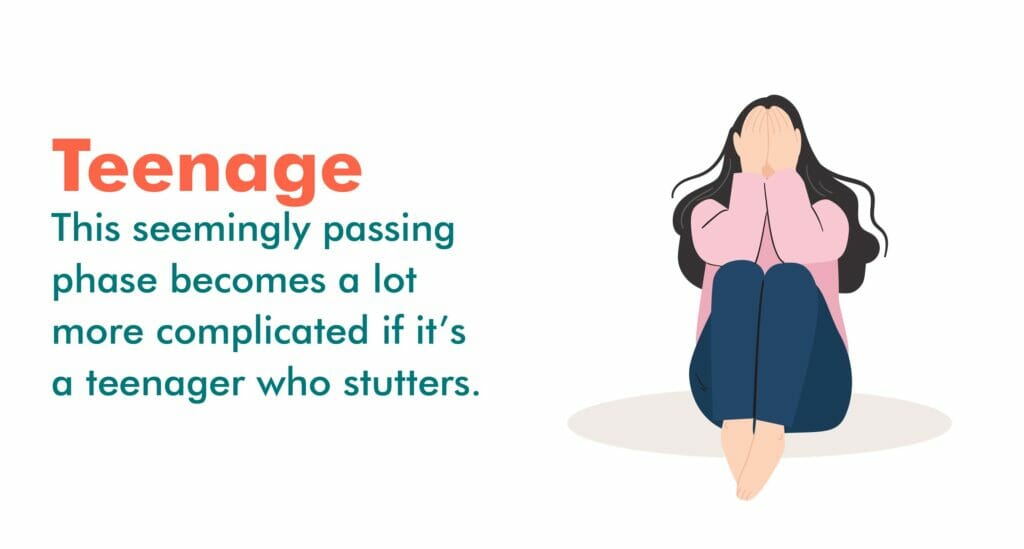Stuttering is a complex disorder. It is variable.
You may have noticed that sometimes your child stutters more than usual, while at other times s/he might sound fluent.
You must have realized that stuttering in teens is involuntary.

The intensity of stuttering in teens can vary with the level of stress, anxiety, fear, or even physical fatigue.
However, since your child is already in teenage, you should know that it is almost impossible for them to “grow out of it.”
An adolescent who stutters should receive speech therapy and practice speech exercises to become more fluent in his/her speech.

Causes of Stuttering in Teens
The first thing you must remember is that stuttering is not a sign of low intelligence. Secondly, your child’s stuttering isn’t your fault.
Here are some of the scientifically proven causes of stuttering in teens –
Stuttering Cause #1 in Teens: Genetics
Scientists have linked multiple genes to speech disfluencies. Children of parent(s) who stutter are indeed more likely to stutter.
Stuttering has nothing to do with how a child is raised.
It is just like any other genetic condition that may or may not pass down from one generation to another.
Since these genes are connected to language processing & production, auditory processing, and other similar functions, there is currently no medical cure for stuttering.
Teenage stuttering treatments that include speech therapy and cognitive-behavioral therapy (CBT) may work wonders for an adolescent child struggling with speech disfluency and self-confidence.
Stuttering Cause #2 in Teens: Differences in Brain Structure & Function
Existing research suggests that people who stutter (PWS) have structural abnormalities in the Broca’s area and Wernicke’s area – the two areas associated with language processing and production in the brain.
The areas connecting the two are also different in both structure and function.
Brain imaging studies have also revealed anomalies in the areas associated with auditory processing.
The fiber tracts connecting areas responsible for language, speech, and auditory activities are also less dense.
A recent study shows that the corpus callosum that connects the right hemisphere with the left in PWS has fewer astrocytes.
The structural differences in the brain create functional differences that result in stuttering.
Stuttering Cause #3 in Teens: Family History
When children continue to stutter into their teens, they will likely stutter in their adulthood, unless they get speech therapy.
In such cases, scientists and speech-language pathologists (SLPs) have noted that one or more members of the family (related by blood) of the teens also stutter.
Stuttering is often familial and it should prompt you to seek the advice of an SLP before your teenager’s stuttering becomes worse.
Stuttering Cause #4 in TeensEnvironment
Children who are already susceptible to stuttering due to genetic or familial factors often react to a drastic change in their environment with stuttering.
Changes may include moving to a new neighborhood, changing schools, separation of parents, or the birth of a new sibling.
These changes only precipitate a stutter in children between the ages of approximately 2 and 4 years old if they have a predisposition.
According to experts like Dr. Van Riper and Dr. Barry Guitar, the environmental factors interact with genetic factors to produce stuttering.
Although high-octane situations like a viva voce, class presentation, or talking to a new person may worsen the symptoms, emotions are NOT the cause of stuttering.
In fact, stuttering is not the disorder itself. The symptoms result in structural differences in the brain.

How to Talk to a Teen Who Stutters
A teenager who stutters already knows that s/he sounds different from their fluent peers.
They already have access to the web and other sources of information where they can learn about speech disfluencies.
As a parent, it is your responsibility to learn the correct facts about stuttering and guide your teenage child in the right direction.
Although a teenager who stutters is likely to speak less, even to his/her parents, you should ensure that your child feels safe talking to you and sharing with you.
That is the first step towards establishing two-way communication with your teenage child.
Here are 5 things you can follow to strengthen your communication with a stuttering child –
1. Learn More about Stuttering
You already know about the causes of stuttering.
Next, learn more about how stuttering affects a teenager’s life.
Studies show that stutter affects an adolescent’s performance in school, social life, and public-speaking situations.
A child may face bullying or teasing in school because of stuttering but not share it with their teachers or parents due to embarrassment.
A study on teenagers who stutter by Keylonda Granger, John A. Tetnowski, the University of Louisiana at Lafayette, & Jim McClure, Albuquerque, NM, indicated that their stuttering had more impact on their lives than their parents fathomed.
Sadly, during the teenage years, the impact of stuttering may be the greatest. However, during these years, parental involvement in therapy and CBT is typically the lowest.
2. Talk To Your Child about Stuttering
As a teenager, your child already has tons of new feelings to deal with.
So make it easier by talking to him/her directly about the causes and effects of stuttering.
However, make sure they are willing to talk and you are not pushing them out of their comfort zone.
It may take time, but they will gradually open up. Teenagers are not the most communicative or easy to talk to, and we get that!
You have to be superbly patient while trying to create a safe space where they can spontaneously talk and share about stuttering.
Make sure your child knows s/he is not alone in this struggle. Share credible sources of inspirational stories, career options, and positive therapy results with them.
3. Empower Your Child
Empowering a teenager is not easy, especially when social media and popular media sets unrealistic standards for them.
To empower your child, begin by reinforcing that stuttering is not a defect. It is also not a limitation.
You can seek the help of a professional counselor and SLP to help your child regain lost confidence. Empowering your kid will help him/her embrace their stutter.
Embracing one’s speech disfluency can empower him/her to believe in his/her own decisions later in life as well.
4. Choose the Right Therapy
While your teenage son/daughter may be old enough to choose the weekend movies or dinner, choosing the right therapy and therapist is still your responsibility.
Look for speech therapists in your area. Check their reviews online. Search for recommendations. You may get some help from the school authorities or the appointed counselor at your child’s educational institute.
Combining speech therapy with CBT can be efficient in decreasing one’s stutter and reducing one’s fear of stuttering.
You can also help your teenager use a speech therapy app such as Stamurai, available for both Android and Apple devices that combines fluency shaping and stuttering modification techniques.
Stamurai speech therapy app is already used by thousands of teenagers around the world. Many teenagers and adults have been able to significantly reduce their stuttering with this app.
5. Stay Connected
Today, you can find websites and pages dedicated to parents of teenagers who stutter. Join these groups to find out more on the latest information on stuttering.
You can learn about new research, therapy techniques, and technology that can help your child stutter less.
Sign up for newsletters from the likes of the National Stuttering Association (NSA, US), Stuttering Foundation, The Stuttering Association for the Young (SAY), and the American Speech-Language-Hearing Association (ASHA).
Attend webinars on stammering and related topics.
Read up published research and authentic material to keep yourself updated on stuttering treatments and opportunities for children who stutter.

Is It Normal to Stutter During Puberty?
If you or your loved one has been stuttering since childhood, then stuttering during puberty is nothing unexpected or out of the ordinary. However, if the signs of stuttering have appeared suddenly without any history of speech disfluency, you need to act fast.
The sudden occurrence of stuttering during puberty may be because of one or more of these factors -
Neurogenic
Traumatic brain injury including concussions, brain tumors, neurodegenerative diseases and even cerebral strokes can lead to stuttering in teens. Damage to the areas of the brain responsible for language processing and speech formation can cause the sudden incidence of stuttering in teens. The attention of neurologists and other medical professionals may be necessary if the teen’s stuttering turns out to be neurogenic in nature.
Psychogenic
An individual may begin stuttering suddenly after a traumatic event or prolonged psychological/emotional turmoil. Post-traumatic stress disorder (PTSD) is known to cause stuttering in a few instances. In such cases, psychological counseling, psychotherapy and CBT may be necessary to address the root of their speech disfluency.
Pharmacogenic
Have you or your teenager started taking a new medicine? Some medicines, especially the psychoactive ones, have the side effect of inducing speech disfluencies. Even some antidepressants that do not typically have profound side effects may cause stuttering in a small percentage of the population. Speak to your doctor and a speech therapist if you think your medicines may be contributing to your stuttering or making it worse!
The Take-away Message
Being a parent is a colossal task, but being a teen isn’t exactly easy either.
While you have to deal with your own feelings of anxiety, protectiveness, and fear for your child, you will also have to be strong for him/her.
You may consider talking to the counselor of your child to see if s/he can help you with your emotional and mental wellbeing as well.
In the meantime, be supportive.
Talk to your child openly about stuttering and keep educating yourself on the complex disorder and the ways you can help your teenage son/daughter.
Frequesntly Asked Questions
Can speech therapy help teenagers who stutter?
It is never too late to begin stuttering therapy. Speech therapy doesn’t work for teens is a myth that you should not believe at all! As long as you have an experienced speech therapist and speech-language pathologist (SLP) you are good to go. Speech therapy for teens who stutter may take more time and effort as compared to children. Therapy will not magically induce fluency, but it may reduce - i) The frequency and intensity of stuttering ii) Word and situation avoidances iii) Fear and anticipation of stuttering. Speech therapy and CBT can help teens rediscover their confidence and boost their conversation skills. Yes. Speech therapy can help teenagers who stutter.
Is it normal for a 14 or 15-year old to stutter?
Anyone can stutter. Around 5% of all children stutter at some point during their childhood. Sadly, some of them don’t overcome stuttering on their own by the time they are older. Without speech therapy these children may continue to stutter in their teens and adult life. Currently, over 70 million people sutter worldwide! So, it is quite normal for 14 or 15-year-olds to stutter if they have also stuttered as children. However, if your child never stuttered as a child and is suddenly showing the signs of stuttering as a teenager, it may be cause for concern. Contact your GP and a speech-language pathologist if your teenage child is suddenly stuttering.
Will my teen’s stutter get worse with age?
If your child has been stuttering ever since they were a toddler, then chances are that their stuttering will not worsen with age. However, emotionally strenuous and anxiety inducing situations may make their stuttering worse. Adolescents face a significant number of challenges at school and in their social life. These factors may contribute to the frequency and severity of their pre-existing stutter. If you notice your teenage child’s stuttering becoming worse with each passing day, you should speak to a speech therapist as well as a psychologist.
Can my teenage son overcome stuttering?
Teenagers can benefit from attending speech therapy sessions with an experienced and professional speech therapist. However, their progress can take time and considerable practice. Therapy and treatment for stuttering should begin as soon as possible. preschool-aged children show the most rapid improvement in speech following speech therapy for stuttering. Stuttering treatment works for all ages, but the rate of progress depends on the severity of an individual’s stutter in addition to several other factors. The goal of speech therapy is to reduce the intensity and frequency of one’s stuttering. They may enjoy increased fluency and reduced number of blocks. Therefore, it is impossible to guarantee that someone will overcome stuttering by practicing speech therapy or stuttering exercises.










